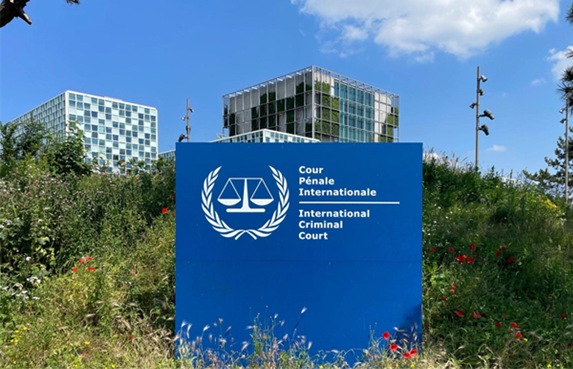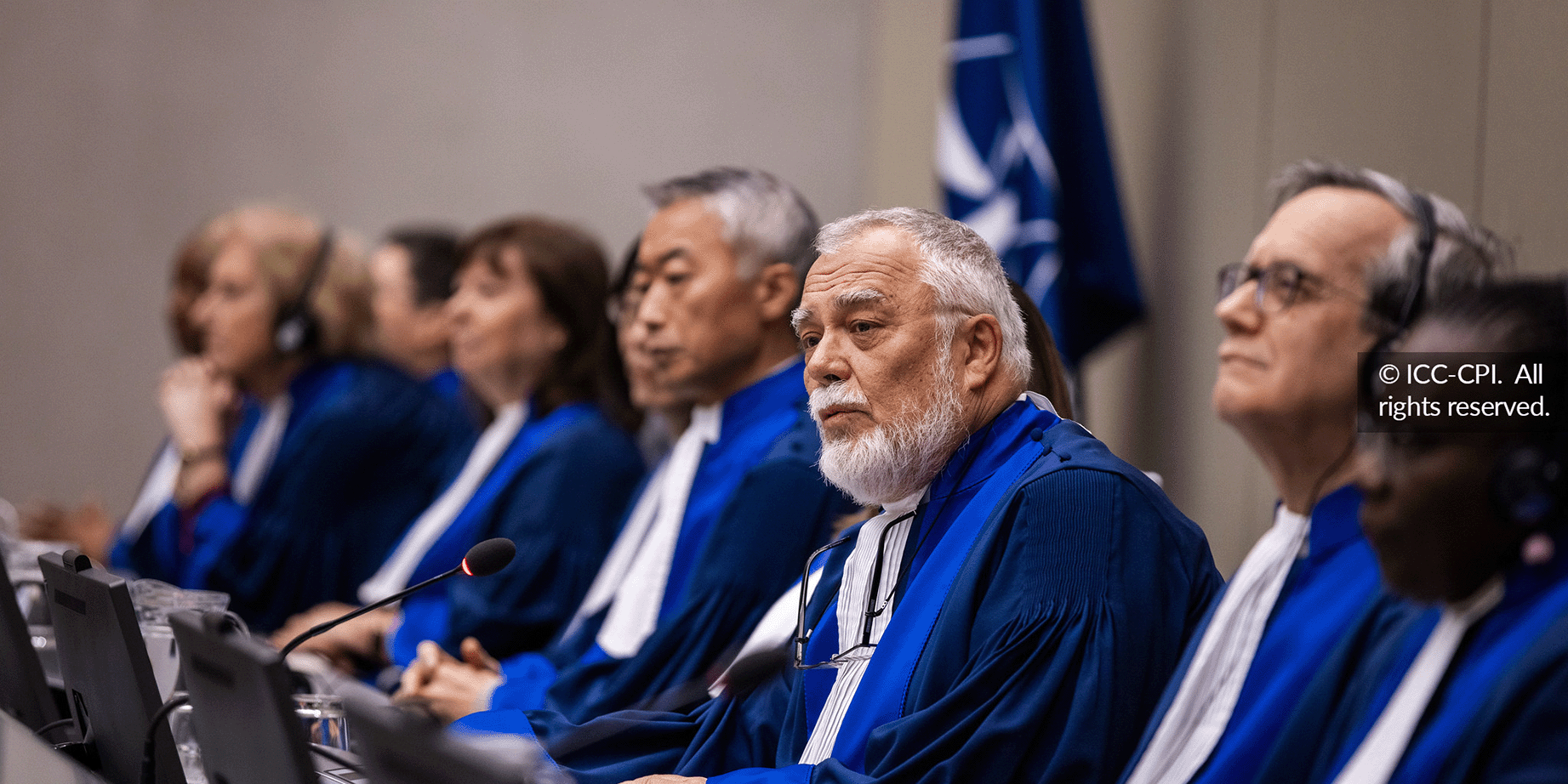
Zinovia Verikokidi
Just Access Representative to the Coalition for the International Criminal Court
What future for international justice, when major powers sanction Courts like the ICC?┬Ā On the 22nd of May 2024, the U.S. House Republicans announced plans to vote on legislation to sanction International Criminal Court (ICC) officials, which materialised less than a month later. On the 4th of June, the House of Representatives voted 247-155 in favour of the Illegitimate Court Counteraction Act.
This decision followed ICC Prosecutor Karim A.A. Khan KC’s filing of arrest warrant applications before the Pre-Trial Chamber I of the ICC on the Situation in the State of Palestine. Begging the question: how can international justice continue to function, if major powers like the United States continue to impose sanctions on institutions like the ICC?

Applications for arrest warrants┬Ā
On the 20th of May, ICC Prosecutor Karim A.A. Khan KC submitted applications for warrants of arrest before Pre-Trial Chamber I of the International Criminal Court concerning the Situation in the State of Palestine.┬Ā
The arrest warrants were issued based on evidence collected and examined by the Office of the Prosecutor (OTP) for alleged war crimes and crimes against humanity committed in the Gaza Strip from the 7th of October 2023. The warrants targeted Yahya Sinwar (Head of the Islamic Resistance Movement in Gaza, Hamas), and Mohammed Diab Ibrahim Al-Masri (Commander-in-Chief of Hamas’ military wing, Al-Qassam).
Additional warrants were issued for Benjamin Netanyahu, the Prime Minister of Israel, and Yoav Gallant, the Israeli Minister of Defence, for alleged war crimes and crimes against humanity committed in the Gaza Strip from the 8th of October 2023. These allegations include using starvation of civilians as a method of warfare, wilfully causing great suffering or serious injury to body or health, cruel treatment, wilful killing, intentionally directing attacks against a civilian population, and extermination and/or murder, including deaths caused by starvation.┬Ā
U.S. Sanctions and the ICC┬Ā
Following the ProsecutorŌĆÖs announcement of the arrest warrants, the U.S. made efforts to impose sanctions against the ICC. Shortly after the announcement, Secretary of State Antony Blinken stated in a U.S. Senate session that he would collaborate with lawmakers to find ŌĆ£an appropriate responseŌĆØ.┬Ā
The Coalition for the International Criminal Court issued an open letter to the White House, urging the Biden Administration to oppose punitive measures against the ICC.
On the 22nd of May 2024, the Coalition for the International Criminal Court (CICC), of which Just Access is a Member, issued an open letter to the White House, urging the Biden Administration to oppose punitive measures against the ICC. The letter highlighted the critical role of the ICC in promoting international justice and called on the administration to protect the Court from actions that could undermine its operations and credibility.┬Ā┬Ā
Subsequently, the U.S. House of Representatives voted to pass legislation sanctioning the ICC and its officials. On the 4th of June, the Republican-controlled House passed the Illegitimate Court Counteraction Act with a vote of 247-155. However, the bill is not expected to become law, as it would likely be blocked by the Democrat-controlled U.S. Senate.┬Ā
Seeds of Hope?┬Ā The UK Election and a Return to the Court┬Ā
The recent UK election has placed the new Labour government at a significant crossroads regarding the ICC and its pursuit of justice. The United States is reportedly exerting significant pressure on Prime Minister Keir StarmerŌĆÖs administration to maintain the legal challenge initiated by the previous Conservative government.┬Ā┬Ā
If the UK yields to U.S. pressure, it could undermine the Court's credibility and its mission to operate free from political influence.
This challenge disputes the ICC’s jurisdiction over alleged war crimes committed by Israeli forces in Gaza, potentially shielding Israeli Prime Minister Benjamin Netanyahu from prosecution. The upcoming decision, due by 26 July, is not just a test for the UK’s legal stance but an important indicator of the ICCŌĆÖs independence. If the UK yields to U.S. pressure, it could undermine the Court’s credibility and its mission to operate free from political influence. Conversely, rejecting the challenge would reinforce the ICCŌĆÖs authority and commitment to global accountability, demonstrating that even powerful nations cannot interfere with the pursuit of international justice.┬Ā┬Ā
Regardless, these actions threaten the ICCŌĆÖs authority and operations. Especially since despite U.S. claims that the arrest warrants indicate judicial overreach, the CourtŌĆÖs actions reflect its mandate of impartiality and independence.┬Ā
The Independence and Impartiality of the ICC┬Ā
The establishment of the International Criminal Court (ICC) through the Rome Statute in 2002, represented a significant advancement for international criminal law. It gave the ICC jurisdiction over the gravest international crimes with the objective of eradicating impunity for perpetrators and prevent further commission through global deterrence. The impartiality and independence of the ICC are crucial to effectively achieving this goal. Therefore, due to the nature of the disputes, political influence is a significant concern. To deter such pressure, several procedural checks are in place.┬Ā
States party to the Rome Statute, the UN Security Council, and the Office of the Prosecutor can all refer a situation to the ICC. However, States and the Security Council can only refer a dispute with specific chronological, geographical, and personal parameters, not a particular case against a specific individual. If neither a State Party nor the Security Council refers a situation, the Prosecutor can still initiate an investigation independently if there are sufficient reasons which is then reviewed by the Pre-Trial Chamber, adding an additional layer of oversight and ensuring freedom from political interference.┬Ā┬Ā
Ultimately, the pursuit of justice through impartiality is central to the ICC’s mandate, and the Court relies on states to respect its authority and decisions in achieving this goal. This framework of checks and balances is designed to protect the ICC’s independence and uphold its mission to deliver justice free from political influence.┬Ā
The use of coercive measures against a judicial institution constitutes a grave interference with the rule of law and adversely affects everyone, particularly because it is an international court.
What does this mean for the Court and the future of International Criminal Justice?┬Ā
The ICC is a judicial body that must remain independent and impartial, that is why these procedural safeguards exist. The use of coercive measures against a judicial institution constitutes a grave interference with the rule of law and adversely affects everyone, particularly given it is an international court. It is important to understand that such measures have long-term consequences by creating a less secure environment for the ICC’s operations.┬Ā┬Ā
The spill-over effect of these sanctions can severely damage the Court’s work and undermine victimsŌĆÖ access to justice. Sanctioning the ICC interferes with its ability to seek justice for crimes such as genocide, war crimes, crimes against humanity, and the crime of aggression. These coercive measures aim to exert pressure on an institution dedicated to upholding international justice, ultimately compromising the global fight against impunity and threatening the integrity of the international legal system.┬Ā
What future for international justice, if major powers sanction Courts like the ICC, or take other measures to restrict their work?┬Ā By imposing sanctions on the ICC, countries set a dangerous precedent that can erode the foundations of international justice. This precedent could embolden other nations to take similar actions, thereby weakening the global system of accountability and protection for human rights. The international community must recognise the importance of supporting and protecting the ICC to ensure it can fulfil its mandate effectively. ┬Ā
Just Access stands firmly in solidarity with the Open Letter of 22nd May to the White House by the Coalition for the International Criminal Court. We join the human rights and civil society groups in urging President Biden to reject and oppose any threats or punitive actions against the ICC. Finally, we emphasise the importance of States respecting the Court’s independence and upholding international justice.┬Ā









